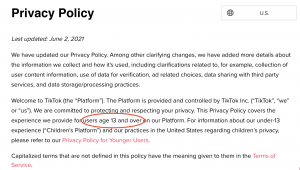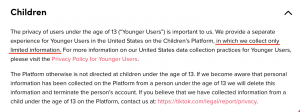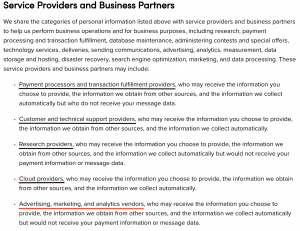Are the kids alright?
By Anonymous | October 29, 2021
Today 84% of teenagers own a cellphone in the US . Further, teens spend an average of 9 hours per day online. While half of parents with teenagers aged 14 to 17 say they are “extremely” or “very aware” of what their kids are doing online, only 30 percent of teens say their parents are “extremely” or “very aware” of what they’re doing online. There are plenty of books, resources and programs/applications to help parents track what their teens are doing online. However, in truth there are just as many ways for kids to get around these types of controls.
This is even more disturbing when we consider that privacy policies of many companies only protect children 13 and under, but do not apply to teenagers. This means that teens are treated as adults when it comes to privacy. For example TikTok, which is the number one app used by teenagers in the US today, states the following in their privacy policy:

By contrast here is an excerpt from TikTok’s privacy policy for children under 13. It states clear retention and deletion processes.

While teens may be fine sharing their data with TikTok in what feels like a friendly community, they may not realize how many partners TikTok is sharing their data with. This list of partners includes ones that we might expect like payment processors, but it also includes advertising vendors that might be less expected/desirable.

In turn, each of these partners has their own data handling, retention, sharing, privacy and deletion policies and practices that are completely unknown to TikTok users.
What about the government?
While we might expect private corporations to do what is in their own best interests, even Congress has been slow to protect the privacy of teens. This week the Congressional subcommittee on Consumer Protection, Product Safety and Data Security questioned policy leaders from TikTok and Snap about the harmful effects of social media on kids and teens.
While these types of investigations are necessary and increase visibility into these companies’ opaque practices, the bottom line is that there are no formal protections for teens today. The Children’s Online Privacy Protection Act (COPPA), enacted in 1998, does impose certain restrictions on websites targeted at children, but only protects children 13 and under. The bill S.1628, which looks to amend COPPA to include protections to teenagers, was only introduced in May of this year . Additionally, there is the Kids Internet Design and Safety Act (KIDS) which was proposed last month to protect the online safety of children under 16. However, all this is still only under discussion – nothing has been approved.
What about protections such as GDPR and CCPA?
The General Data Protection Regulation (GDPR) which went into effect in Europe in 2018, was enacted to give European citizens more control over their data. It includes the “right to be forgotten” which states:
“The data subject shall have the right to obtain from the controller the erasure of personal data concerning him or her without undue delay and the controller shall have the obligation to erase personal data without undue delay” if one of a number of conditions applies. “Undue delay” is considered to be about a month.
Similarly in the US, California has enacted the California Consumer Privacy Act (CCPA), which went into effect in 1998, extends similar protections to California residents. While it is likely that many other states will follow suit with similar types of protections, companies are able to interpret their implementation of these regulations as they see fit, and many are still figuring out exactly how to implement these policies tactically in their organizations. Until then teens will continue to create a digital footprint and audit trail that could follow them for many years into the future.

How do we move forward?
As we see, there are many places where privacy protections for teens break down. They are legally children, but have none of the protections that kids should have. Google this week announced that children (persons under the age of 18) or adults on their behalf have the ability to request that photos of them be removed from the search engine. This is a step in the right direction. However, we need more. We need governmental agencies to move more quickly to enact legislation to provide stronger, explicit protections for teens so that their privacy protections are not dictated by the whims of online companies – we owe them that much.
Sources:
“It’s A Smartphone Life: More Than Half Of US Children Now Have One.” 31 Oct. 2019, https://www.npr.org/2019/10/31/774838891/its-a-smartphone-life-more-than-half-of-u-s-children-now-have-one. Accessed 7 Oct. 2021.
“How much time does a teenager spend on social media?.” 31 May. 2021, https://www.mvorganizing.org/how-much-time-does-a-teenager-spend-on-social-media/. Accessed 25 Oct. 2021.
“Think You Know What Your Teens Do Online? – ParentMap.” 16 Jan. 2018, https://www.parentmap.com/article/teen-online-digital-internet-safety. Accessed 25 Oct. 2021.
“Text – S.1628 – 117th Congress (2021-2022): Children and Teens ….” https://www.congress.gov/bill/117th-congress/senate-bill/1628/text. Accessed 7 Oct. 2021.
“Google now lets people under 18 or their parents request to delete ….” 27 Oct. 2021, https://techcrunch.com/2021/10/27/how-to-delete-your-kids-pictures-google-search/. Accessed 28 Oct. 2021.
